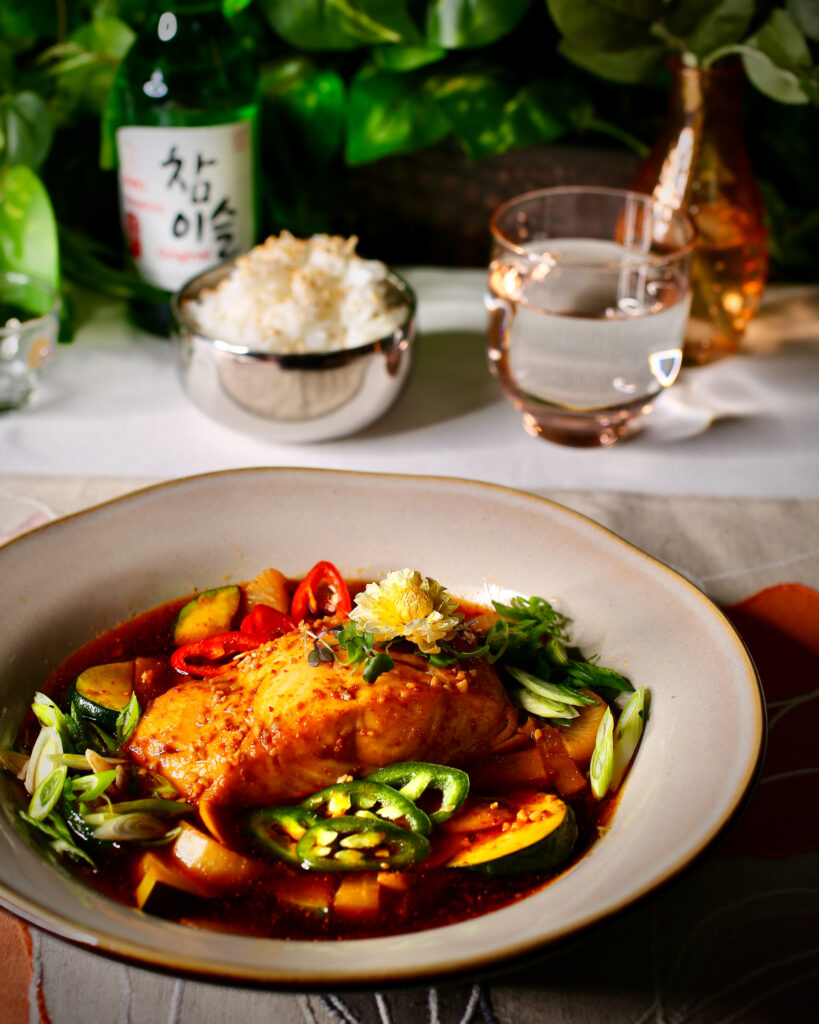 Korean Soy-Braised Black Cod
Korean Soy-Braised Black Cod
Eun Daegu Jorim
Eun Daegu (black cod) Jorim (a slightly-sweet soy-based braise) is a delicious and visually appealing dish that showcases the intricate balance of flavors and textures inherent in Korean cuisine. Luscious and silky black cod is simmered in the well-seasoned braise with garlic, ginger, red chile powder and red chile paste. The fish cooks along with radish and zucchini as they all absorb those savory-sweet-spicy-umami flavors. The garnishes add fresh, herbaceous, and fiery notes.
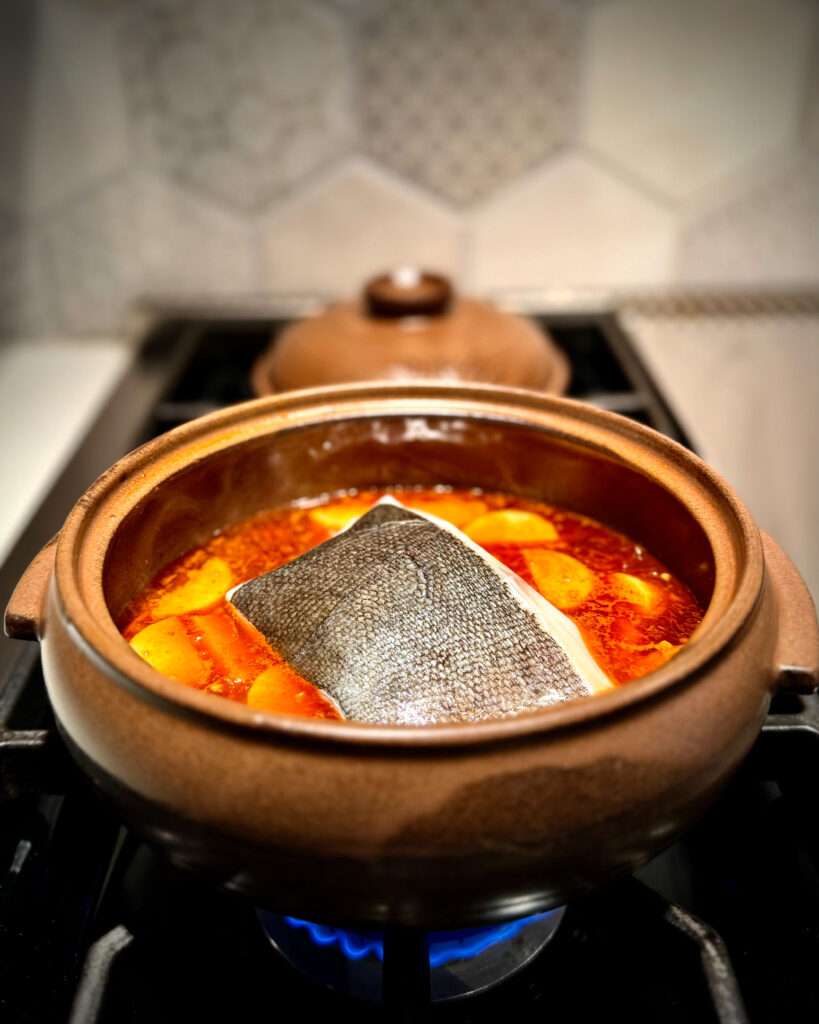
This dish is easy to prepare, requiring simple techniques, yet it boasts a complexity of flavors that surpasses expectations. And the beauty of this Korean homestyle meal is that it can be prepared in a half hour with frozen black cod. No need to defrost overnight, nor use the quick-defrost method of submerging the fish in cold water for an hour. Nope. Just cook from frozen – the quality and texture of the fish are not compromised.
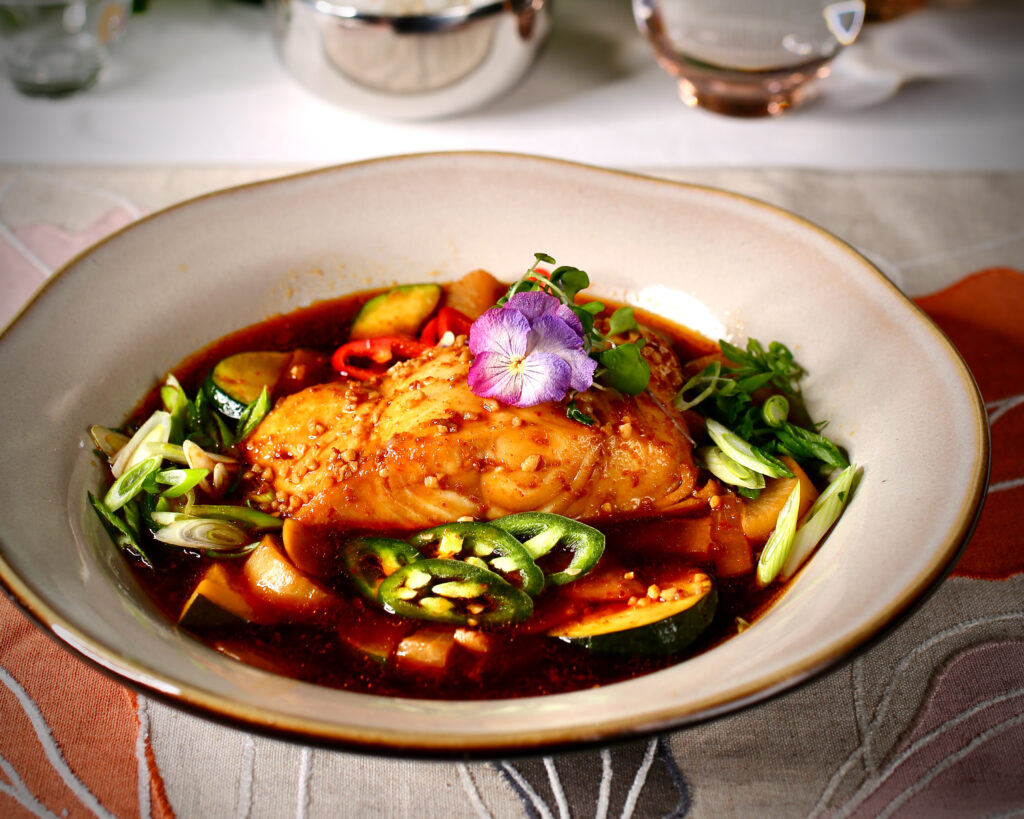
Korean Soy-Braised Black Cod Recipe
Ingredients
approx. 8 0z. fillet of black cod (eun daegu), frozen
1 c. filtered water
3 T. low- sodium soy sauce
1 T. toasted sesame oil
2 -3 garlic cloves, minced
1″ knob of ginger, peeled and thinly sliced into coins
2 t. brown sugar
1 t. gochugaru
1 t. gochujang
4 oz. mu or daikon radish, peeled and sliced into rounds or half-moons
4 oz. zucchini, sliced into half-moons
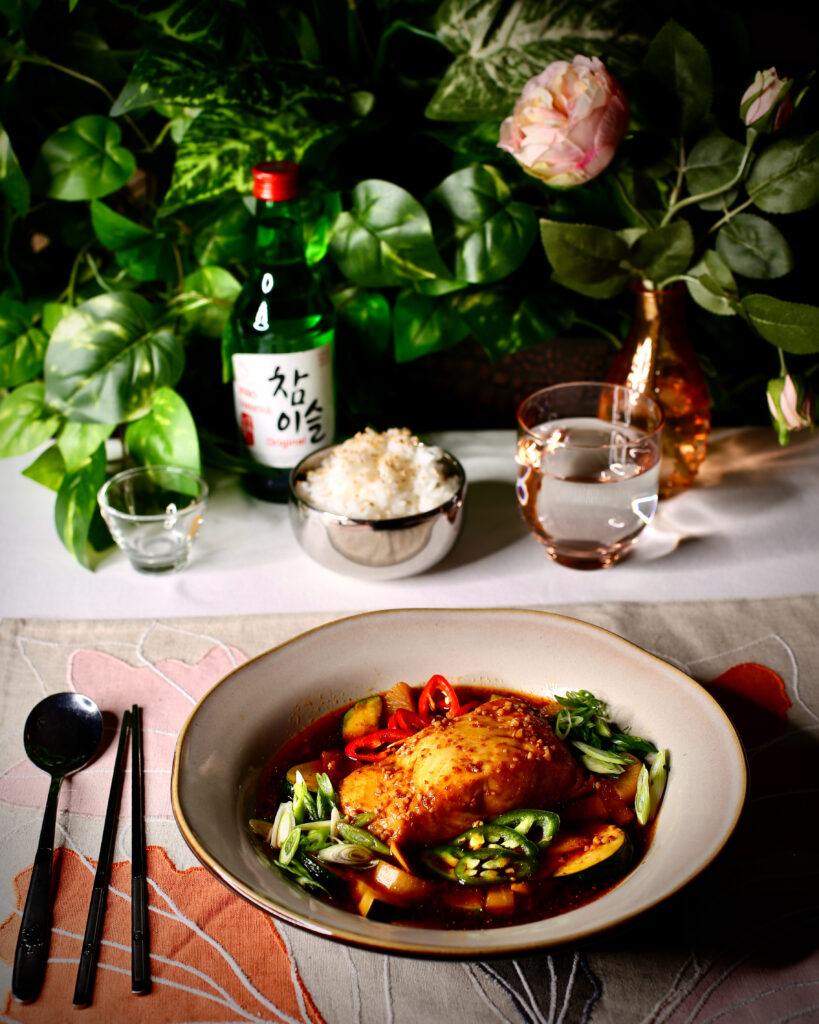
Method
Rinse frozen fish under cold running water then place it on a plate. Set aside while prepping the other ingredients.
Add water, soy sauce, sesame oil, garlic, ginger, sugar, gochugaru, and gochujang to a medium pot or ttukbaegi (Korean earthenware pot).
Bring to a boil, add radish, then turn down to medium-low for 5 minutes.
Add the black cod fillet, skin-side-up, and cook for 5 more minutes, then carefully flip the fish over without breaking up the fillet. Continue to simmer for another 10-12 minutes, half way through, add the zucchini.
Notes
The radish is added early in the braising, to soften and soak up all the flavors. The zucchini is added in the last 5 minutes so that it cooks and absorbs the braising liquid, but does not become too mushy.
The fish fillet is cooked with its skin and bones. Easily remove the bones after braising. The skin keeps the fillet intact while cooking. It slips off easily after braising. Eating the skin is a matter of preference.
Several jorim recipes add red chili powder (gochugaru), here I also use red chili paste (gochujang) to add chili flavor complexity. Gochujang is a Korean red chili paste with sweet heat and a fermented umami richness. It has a balanced fruitiness, slight smokiness and depth of flavor from the sun-dried Korean red peppers. Gochugaru, also made from sun-dried red peppers, is a coarse-ground chili powder. Together, they give this jorim its distinctive Korean spiciness.
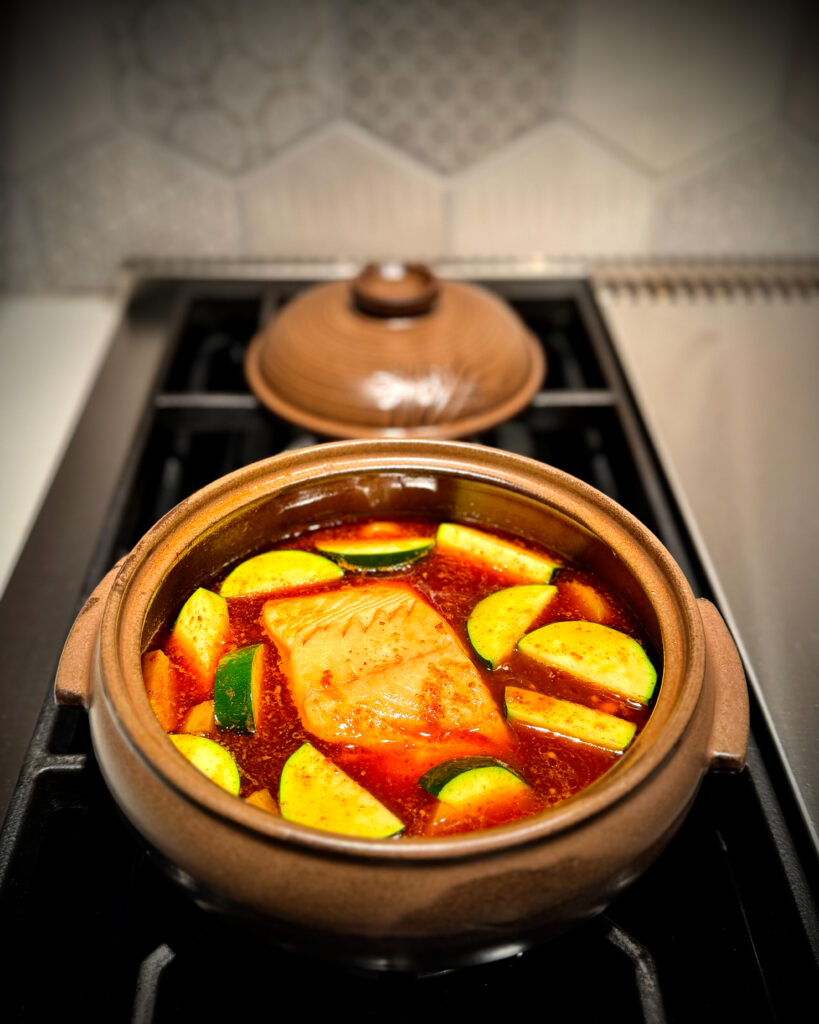
To Serve
scallions, thinly sliced
red chile, thinly sliced
jalapeño, thinly sliced
microgreens
edible flower (optional)
white rice for serving
Ladle some of the broth and vegetables into a warm shallow bowl. Place fish in the center. Garnish with scallions, red and green chiles, and microgreens. Serve fluffy hot white rice on the side.
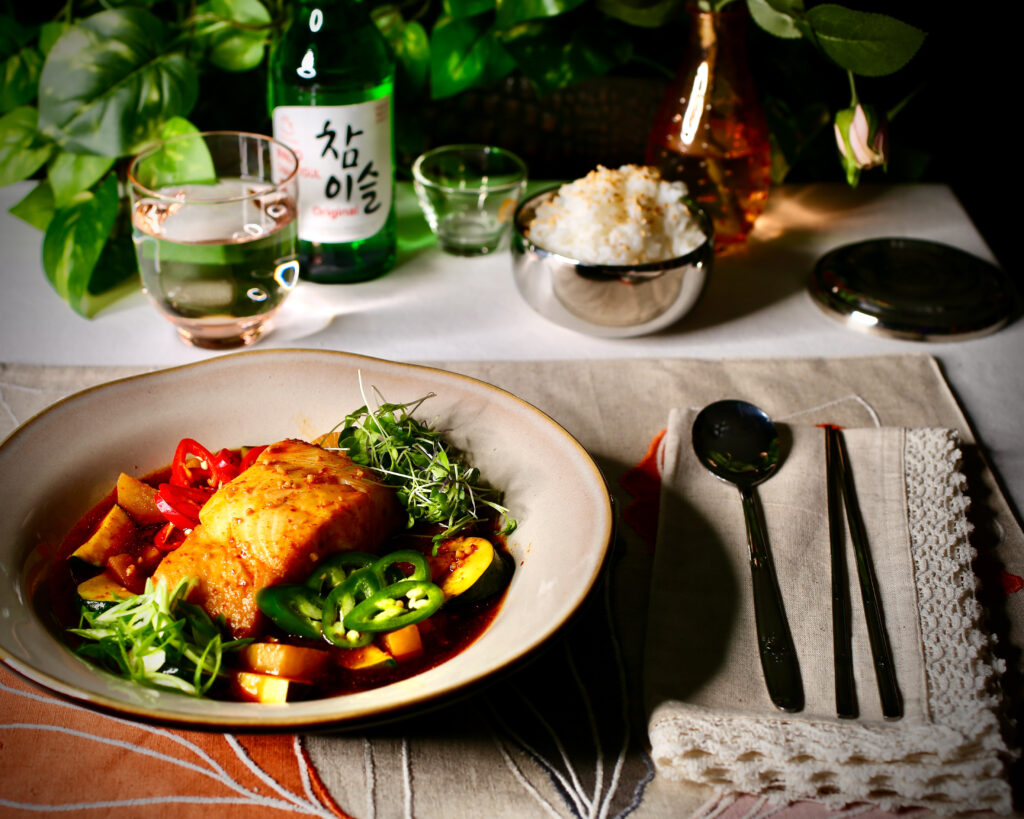
Some of My Favorite Korean/Fusion Recipes
Sundubu Jjigae (soft tofu stew)
Korean Macaroni and Cheese (with beef, kimchi, cheddar)
Buchu Jeon (garlic chive blossom pancake)
Samgyetang (a rejuvenating chicken soup with ginseng)
Kimchi Lasagne (korean-italian fusion)
Jajangmyeon (black bean noodles)
Korean BBQ Chicken (with lettuce cups, white seaweed salad)
Kimchi Potato Latkes (korean-jewish fusion)
Bindaetteok (mung bean pancakes)
Soju Kimbap Bloody Mary (geonbae)
Hwa Jeon (rice tea cakes with honey)
Yakgwa (fried honey cookies with cinnamon ginger syrup)
Other “Cook from Frozen” Fish Dishes
Smoky Salmon Stew with Tomato, Potato, and Fennel

Amazing. Will try soon.